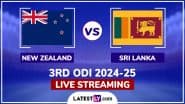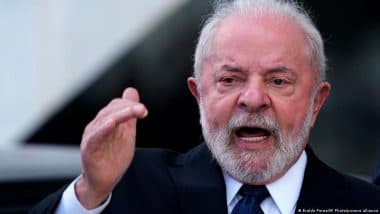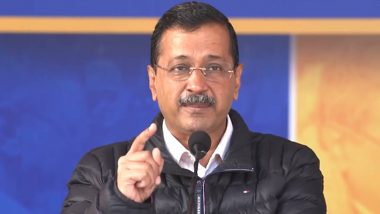Predictions about the BRICS countries as the fastest growing economies haven't quite panned out. Instead, the alliance is now offering a diplomatic forum and development financing, outside of the Western mainstream.The acronym began as a somewhat optimistic term to describe what were the world's fastest-growing economies at the time. But now the BRICS nations — Brazil, Russia, India, China, South Africa — are setting themselves up as an alternative to existing international financial and political forums.
Also Read | Mumbai Man Duped of Rs 5 Lakh by Cyber Fraudster Posing As 'Former First Lady of Afghanistan'.
"The founding myth of the emerging economies has faded," confirmed Günther Maihold, deputy director of the German Institute for International and Security Affairs, or SWP. "The BRICS countries are experiencing their geopolitical moment."
Also Read | World News | US Navy Destroyer Sails Near Contested Island in South China Sea Militarized by Beijing.
Brazil, Russia, India, China and South Africa are trying to position themselves as representatives of the Global South, providing "an alternative model to the G7."
The G7 is an "informal forum" of heads of state of the world's most advanced economies, founded in 1975. Germany, France, the United Kingdom, Italy, Japan, Canada and the US are members, as is the EU.
The acronym BRIC, which initially stood for Brazil, Russia, India and China, was coined by Jim O'Neill in 2001 when he was chief economist of the multinational investment bank, Goldman Sachs. At the time, the four countries had sustained rates of high economic growth and the BRIC label stood for economic optimism about the future of those nations. Opponents of the label said the countries were too diverse to be grouped together like this and that it was really just a Goldman Sachs marketing ploy.
But what may have started as a marketing ploy to encourage investors has grown into a platform for intergovernmental cooperation similar to the G7. In 2009, the four nations met for their first summit in Russia's Yekaterinburg. In 2010, South Africa was invited to join the group, adding the "S" to BRICS.
Challenging the World Bank model
In 2014, with $50 billion (around €46 billion) in seed money, the BRICS nations launched the New Development Bank as an alternative to the World Bank and the International Monetary Fund. In addition, they created a liquidity mechanism called the Contingent Reserve Arrangement to support members struggling with payments.
These offers were not only attractive to the BRICS nations themselves, but also to many other developing and emerging economies that had had painful experiences with the IMF's structural adjustment programs and austerity measures. This is why many countries said they might be interested in joining the BRICS group.
The BRICS bank is open to new members. In 2021, Egypt, the United Arab Emirates, Uruguay and Bangladesh took up shares. However, these were much lower than the respective $10 billion investments made by the bank's founding members.
Set to expand
South African Foreign Minister Naledi Pandor has said worldwide interest in the BRICS group was "huge." In early March, she told television interviewers that she had 12 letters from interested countries on her desk.
"Saudi Arabia is one," she said. "United Arab Emirates, Egypt, Algeria, and Argentina," as well as Mexico and Nigeria.
"Once we've shaped the criteria [for lending], we will then make the decision," she said, noting that the topic would be placed on the agenda for the upcoming August summit in South Africa.
The most recent economic developments in BRICS member states have little to do with the initial myths upon which the group was founded. Of the five members, only China has achieved sustained and extensive growth since then.
As China's gross domestic product grew from $6 trillion in 2010 to nearly $18 trillion in 2021, the economies in Brazil, South Africa and Russia stagnated. India's GDP grew from $1.7 trillion to $3.1 trillion, but was outpaced by China's growth.
No sanctions against Russia
Since the start of the Russian war in Ukraine, the BRICS countries have only distanced themselves further from the so-called West. Neither India, Brazil, South Africa or China are taking part in sanctions against Russia. This has become increasingly clear with near-historic levels of trade between India and Russia, or in Brazil's dependence on Russian fertilizer.
"Diplomatically, the war in Ukraine appears to have drawn a stark dividing line between an eastern-backed Russia and the West," political scientist Matthew Bishop from the University of Sheffield wrote for the Economics Observatory late last year. "Consequently, some European and US policymakers worry that the BRICS may become less an economic club of rising powers seeking to influence global growth and development, and more a political one defined by their authoritarian nationalism."
Maihold of the German Institute for International and Security Affairs agrees. He said the BRICS alliance is not so much a counter to the West but more a forum for increased sovereign and autonomous thought. In a bipolar world, he believes South Africa, India and Brazil are simply "vying for better terms."
China, on the other hand, is using the platform for its global political ambitions, Maihold added, pointing to Beijing's offers to mediate the war in Ukraine and the joint military exercises it held with Russia in South Africa.
Maihold believes the West has noticed this change in tack and is trying to counteract it. "They are looking very closely," he said. "At the G7 summit in Germany in 2022, they made a point of inviting South Africa and India, in order to prevent the optics that the G7 was standing against BRICS."
This article was translated from German.
Editor's note: The article's previous top image showed Brazil's former president, Jair Bolsonaro, in a virtual conference with other BRICS leaders. It was replaced with an image of Brazil's current president, Lula da Silva, on March 29, 2023.
(The above story first appeared on LatestLY on Apr 10, 2023 03:30 PM IST. For more news and updates on politics, world, sports, entertainment and lifestyle, log on to our website latestly.com).













 Quickly
Quickly




















